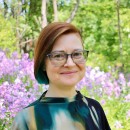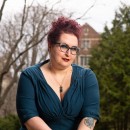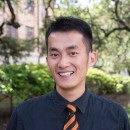Faculty News
Pages
 Julie Ribaudo Elected to Executive Committee of WAIMH
Julie Ribaudo Elected to Executive Committee of WAIMHClinical Professor Julie Ribaudo was elected to a four-year term on the Executive Committee of the Board of Directors for the World Association for Infant Mental Health (WAIMH), a nonprofit organization for scientific and educational professionals. WAIMH's central aim is to promote the mental well-being and healthy development of infants worldwide, taking into account cultural, regional and environmental variations, and to generate and disseminate scientific knowledge.
- March 14, 2024
- Learn more »
 M. Candace Christensen Named a U-M Public Engagement Faculty Fellow
M. Candace Christensen Named a U-M Public Engagement Faculty FellowAssociate Professor M. Candace Christensen has been named a Public Engagement Faculty Fellow by the U-M Office of the Vice President for Research. The fellowship offers an opportunity for faculty members to consider how they can prioritize outward engagement in their scholarly activity and translate it into meaningful public impacts.
“My vision for who I want to be as a professional scholar in 5-10 years is to be exceptionally proficient at translating my own research, but also a guide, mentor, and leader for translating research into accessible, engaging, practical, and useful knowledge,” said Christensen. “The Public Engagement Faculty Fellowship will provide me with the mentorship, social networks, skills, and resources to achieve these goals.”
- March 14, 2024
- Learn more »
- Six School of Social Work Professors Selected as SSWR Conference Cluster Co-Chairs
Six School of Social Work Professors have been selected to serve as cluster co-chairs for the Society for Social Work and Research (SSWR) Annual Conference. Cluster chairs play a significant role in the abstract review and development of the abstract-based program content for the SSWR annual conference.
Associate Professor Lindsay Bornheimer — Mental Health cluster
Assistant Professor James Ellis — Black and African Diaspora Focused-Research cluster
Assistant Professor Odessa Gonzalez Benson — Race and Ethnicity cluster
Associate Professor Shanna Kattari — Gender cluster
Associate Professor Kathryn Maguire-Jack — Inequality, Poverty, and Social Welfare Policy cluster
Associate Professor Camille Quinn — Black and African Diaspora Focused-Research cluster
- March 12, 2024
- Learn more »
 Greer Hamilton Selected as an Agent of Change Fellow
Greer Hamilton Selected as an Agent of Change FellowResearch Fellow Greer Hamilton, PhD ’23, has been selected as an Agent of Change Fellow. Sponsored by the Environmental Health News and Columbia University Mailman School of Public Health, the program is designed to empower emerging leaders from historically excluded backgrounds in science and academia to reimagine solutions for a just and healthy planet.
- February 27, 2024
- Learn more »
 Shanna Kattari Discusses Polyamory in USA Today
Shanna Kattari Discusses Polyamory in USA TodayAssociate Professor Shanna Kattari spoke with USA Today about polyamory, the changing attitudes towards monogamy and increased interest in different relationship styles. "The more that even monogamous people are willing to learn and educate themselves about polyamory, the better it is for everyone," said Kattari.
- February 27, 2024
- Learn more »
- Shanna Katari Speaks with Marketplace About Job Discrimination Faced by Transgender People
Associate Professor Shanna Katari spoke with NPR’s Marketplace about job discrimination and the role it plays in the higher rates of economic hardship that transgendered people face in the U.S. “So it might not be something as explicit as ‘I’m not hiring you because you’re trans,’ but ‘I’m not hiring you because you don’t match my idea of what a woman should look like,’” they said.
- February 20, 2024
- Learn more »
 Daicia Price Speaks with Local New Live on Social Media and Loneliness
Daicia Price Speaks with Local New Live on Social Media and LonelinessAssociate Clinical Professor Daicia Price spoke with Gray TV’s Local News Live about social media and loneliness. “Social Media has a role in our society,” she said, “but it is not a replacement for those intimate connections that people probably were really desiring.”
- February 20, 2024
- Learn more »
 Shanna Kattari Interviewed on PBS NewsHour Weekend
Shanna Kattari Interviewed on PBS NewsHour WeekendAssociate Professor Shanna Kattari was interviewed on PBS NewsHour Weekend in a segment on the challenges of love and dating while living with disabilities.
“I think nondisabled people really buy into a lot of the notions that have been perpetuated around disability and disabled people, such as disabled folks are all asexual, which is not true,” said Kattari. “There is this idea that we should feel grateful to be asked on a date or grateful to be partnered with, which is totally not the case.”
- February 15, 2024
- Learn more »
 Anao Zhang Named to the Sojourns Scholar Leadership Program
Anao Zhang Named to the Sojourns Scholar Leadership ProgramAssistant Professor Anao Zhang has been named to the 2023 cohort of the Sojourns Scholar Leadership Program. Established by the Cambia Health Foundation in 2014, the program advances the next generation of palliative care leaders across a range of disciplines — including nursing, social work, pharmacy, communications, health systems, psychology and spirituality —with a goal of increasing palliative care access, awareness and quality across the nation. Zhang will receive a two-year, $180,000 grant for his project “Developing and implementing an inclusive and equitable framework to integrate palliative care services in adolescent and young adult (AYA) oncology programs.”
- January 30, 2024
- Learn more »
 Camille Quinn Speaks with KVUE on New Texas Law to Keep At-Risk Youth out of the Legal System
Camille Quinn Speaks with KVUE on New Texas Law to Keep At-Risk Youth out of the Legal SystemAssociate Professor Camille Quinn spoke with ABC affiliate KVUE in Austin, Texas, about a new state law designed to keep at-risk youth out of the juvenile justice system. “Once you touch that legal system, it's very difficult to get un-ensnared," she said.
- January 17, 2024
- Learn more »